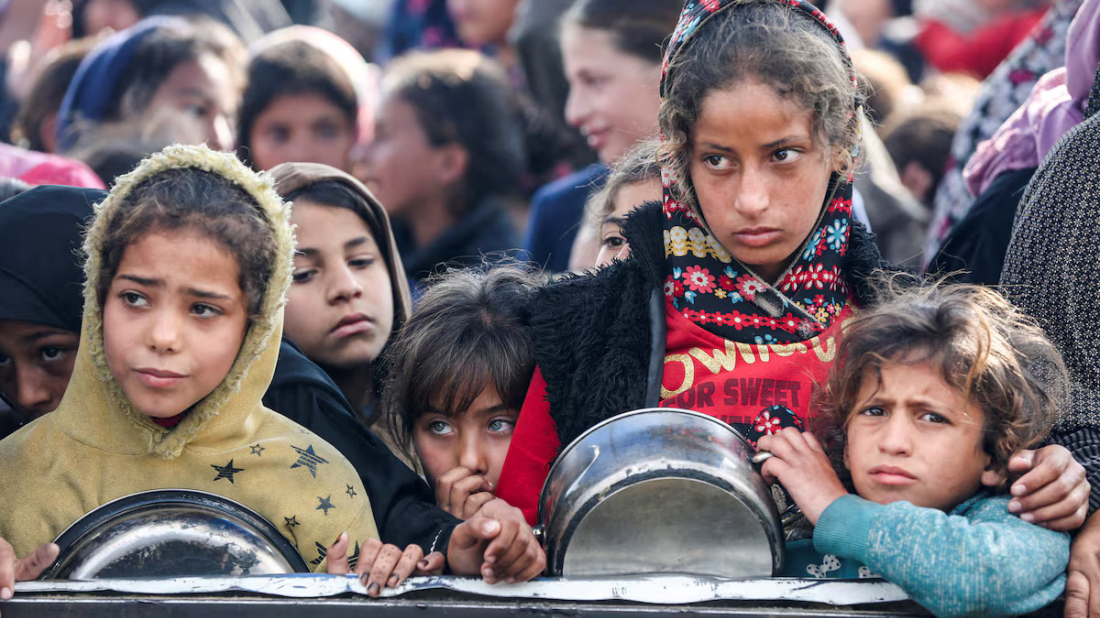'Leadership must change': Scottish Labour leader calls on UK Prime Minister Keir Starmer to quit
Scottish Labour leader Anas Sarwar has called on Prime Minister Keir Starmer to step down, saying that “the distraction needs to end and the leaders...

Israel has allowed limited humanitarian aid into Gaza for the first time since it imposed a near-total blockade in March, enabling some bakeries to resume bread production and delivering baby food and medical supplies to the war-torn enclave.
But Palestinian officials say the amount is far from sufficient to meet dire needs after 11 weeks of severe shortages.
On Wednesday, 100 aid trucks were permitted to enter the territory, including 90 carrying essential goods, such as flour, according to Palestinian officials and aid agencies. The limited easing comes after intense international pressure on Israel to prevent a deepening humanitarian catastrophe. The UN has warned that one-quarter of Gaza’s 2.3 million residents are now at risk of famine.
“Some bakeries will begin receiving flour to produce bread, and we expect the distribution of bread to begin later today,” said Amjad al-Shawa, director of the Palestinian Non-Governmental Organizations Network in Gaza, speaking to Reuters.
However, he cautioned that the volume of aid remains woefully inadequate: “During the ceasefire, 600 trucks used to enter every day, which means that the current quantity is a drop in the ocean—nothing.”
The UN’s World Food Programme (WFP) is coordinating the operation. Bread will be distributed by WFP staff to vulnerable families under a controlled delivery system, in contrast to earlier methods where subsidized bread was sold directly to the public by local bakeries.
“The idea is to try and reach the most needy families, those who are desperate, as it is just the start,” said Shawa.
Israel imposed the full blockade in March, citing concerns that Hamas was diverting aid for military use—an allegation Hamas denies. The blockade has exacerbated an already deteriorating humanitarian situation, with shortages of food, water, fuel, and medical supplies affecting civilians across the enclave.
Meanwhile, the humanitarian update comes against the backdrop of ongoing Israeli military operations, which Palestinian medics say have killed at least 35 people in Gaza in recent days. Efforts by international organizations and regional mediators to broker a lasting ceasefire and restore aid flows continue, but progress has been slow.
While the resumption of aid deliveries marks a slight easing of restrictions, aid officials and local residents say much more is urgently needed to avert a wider humanitarian disaster.
U.S. President Donald Trump has criticised American freestyle skier Hunter Hess after the athlete said he felt conflicted about representing the United States at the Winter Olympics in Italy, sparking a public clash that highlights growing political tensions surrounding the Games.
U.S. skiing great Lindsey Vonn underwent surgery in an Italian hospital on Sunday after her attempt to win Olympic downhill gold ended in a violent crash just seconds into the race at the Milano Cortina Winter Games.
A Japanese city near Mount Fuji has cancelled its annual cherry blossom festival, saying growing numbers of badly behaved tourists are disrupting daily life for residents.
Several avalanches struck northern Italy on Saturday, killing at least three people, as rescue officials warned the death toll could rise with unstable conditions persisting across the Alps.
U.S. President Donald Trump’s Middle East envoy Steve Witkoff and Trump’s son-in-law Jared Kushner visited the USS Abraham Lincoln aircraft carrier in the Arabian Sea on Saturday after completing a round of talks with Iran.
Scottish Labour leader Anas Sarwar has called on Prime Minister Keir Starmer to step down, saying that “the distraction needs to end and the leadership in Downing Street has to change.”
António José Seguro’s decisive victory over far-right challenger André Ventura marks an historic moment in Portuguese politics, but analysts caution that the result does not amount to a rejection of populism.
Japan’s snap election has delivered a landslide victory for Sanae Takaichi, giving her a strong mandate to advance fiscal expansion and defence reforms. But, analysts warn that inflation risks and funding challenges could complicate her agenda.
Australia’s move to ban social media access for children under 16 has intensified a global debate, as governments across Europe and beyond weigh tougher rules amid growing concerns over mental health, safety and screen addiction.
The UK has pledged to step up engagement with Beijing after Hong Kong media tycoon and British citizen Jimmy Lai was sentenced to 20 years in prison, with the case resurfacing as a key issue following Prime Minister Keir Starmer’s recent trip to Beijing.
You can download the AnewZ application from Play Store and the App Store.

What is your opinion on this topic?
Leave the first comment